Expert Interviews
- University Reviews
- Career Guide
 Video Counseling
Video CounselingImportant Facts
- Ask any Question - CV Forum

Online Learning In 2026- What Is It And How Does It Work?
College Vidya Team Jan 21, 2026 2.8K Reads

Over the course of the past few years, technology and new innovations have paved the path for digitization of virtually all aspects of life, ranging from communication across the globe to booking accommodation and travel services through a mobile device. It is only expected then that education won’t be left far behind in this fast pace of virtual and digital growth.
Online learning has become a household term now in developed as well as developing countries across the globe. But the fundamental aspect to look into is what do we mean by online learning? And how to utilise such a ground-breaking and immensely powerful resource to one’s growth?
Here, we have broken down all the basics of online learning for you in the simplest terms. Continue reading to explore a plethora of resources and key info regarding online learning and best education online practices.
What is Online Learning?
Online Learning is an innovative approach to education wherein an interested person learns through the virtual mode, which is more commonly called the “online” mode. The essence of online learning lies in the usage of a variety of digital resources, online tools, platforms and modalities for education. It is the learning that occurs through usage of such resources which is referred to as online learning.
The simplest example of online learning is the learning of a skill like learning to play guitar, knit, or to use an application via the internet or a video streaming platform like Youtube. At a more systematic level, online learning involves full-fledged courses (both short-term and long-term) that are delivered through the virtual mode using a variety of resources and virtual tools.
Online Learning Meaning
Online learning, as already explained, is the form of learning and education that relies on the usage of various virtual and internet-based resources. This includes all forms of learning, ranging from short-term skill building to long-term education (such as higher education through online modes). Online learning can be both live and in real time or asynchronous, which is further elaborated ahead.
So, in its simplest form, online learning can involve any form of education (informal or formal) which makes use of the internet and the virtual platform. Knowledge dissemination through the internet and virtual world has become a quintessential part of our lives in the 21st century. Online learning is a more systematic and comprehensive extension of the same practice, wherein formal education is delivered completely through virtual and online means.
|
Top Trending Certification and Diploma Online Courses |
|
Many institutions of education are now adopting this innovative measure and platform of learning to provide knowledge and education to learners across the world. The popularity and advent of online learning promises a bright scope of growth in the field and fulfilment of the educational needs of a large number of students and eager learners.
Types of Online Learning
With a foundational understanding of what online learning is, here are a few common types (or forms) of online learning. Different platforms and educational institutions may opt for different types/modes of online learning.
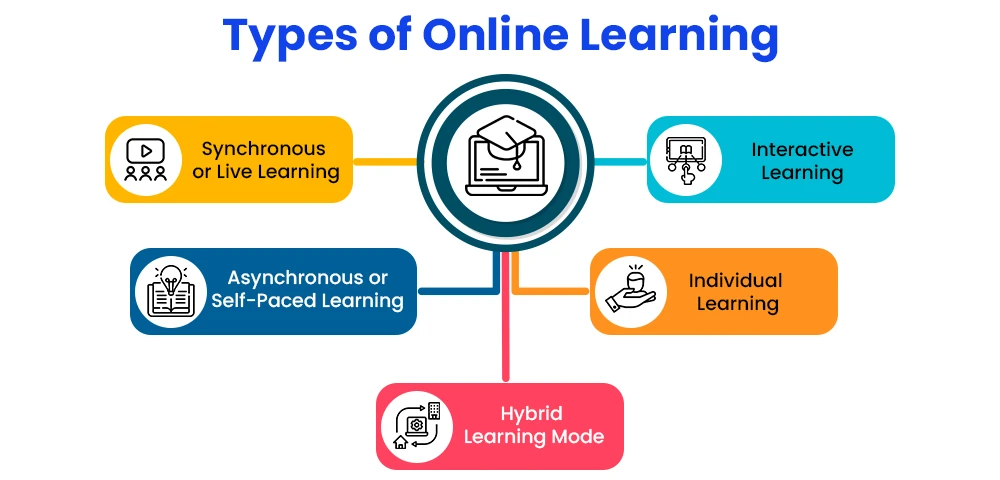
1) Synchronous (Live) Online Learning
Synchronous online learning is the type of learning in the online mode wherein students learn in the live mode, i.e. the teaching and learning occurs in real time, where a number of learners, instructors etc. interact and participate in the process together.
Synchronous or live online learning is one of the most preferred modes of online learning by students as well as instructors across the globe as it helps to simulate a real classroom setting, facilitates communication and interaction between peers, teachers and students as well as leads to greater learning through peer discussions and doubt resolution.
2) Asynchronous Online Learning
Asynchronous online learning is the form of virtual education which does not include learning in real time. Rather, the learning materials, instructions as well as lectures in a course can be uploaded and accessed by students as per their needs.
Asynchronous online learning, although limits the scope for active interaction with peers or instructors, can be a very useful form of education in that it helps in flexible education at one’s own pace and comfort, an aspect which may get ignored often in the synchronous learning mode or the conventional education itself! Asynchronous online learning is also referred to as self-paced learning in many cases.
A common example of this type of online learning is when a person decides to pursue and train themselves in a skill on their own, through videos, step-by-step guides etc. available on the internet at their own pace. This is asynchronous and not live education and occurs as per one’s own pace of learning and convenience.
3) Hybrid Online Learning
Hybrid online learning is a learning form which creates a blend of synchronous and asynchronous modes of learning. This form of online learning involves some aspects of learning in real time, whereas other aspects are delivered in an asynchronous manner.
This is one of the most popular and beneficial forms of online learning as it incorporates both interactive learning with the space for convenience and self-paced education. Students who are pursuing this type of online learning can gain much from the combination of peer discussions, interactive learning that it brings in addition to the ebenfit of learning at one’s own pace.
Most educational institutions that have online learning provisions deliver it through a hybrid approach of learning.
4) Individual Online Learning
Individual online learning is an individual learner-oriented form of learning in the virtual mode, wherein instructors or peers may not be actively involved with the learning process of an individual student. Such a form of learning is the individual driven and automated feedback and evaluation of progress based on the needs and performance of the learner may be provided in this case.
This form of learning is used when a learner is looking for courses or online learning which is not necessarily peer driven or classroom-oriented but meet the individual needs of the learner. This form of learning may have synchronous or live learning aspects, but in most cases involves an asynchronous learning approach, as the student may choose to learn at their own convenience and pace, rather than in a live and interactive setup.
A common example of individual learning can be the individual short-term and long-term MOOCs that are available on various online learning platforms which can be taken up by any learner, without any time constraints or deadlines, and can be further completed at their own pace.
5) Interactive Online Learning
As the name suggests, interactive online learning involves multiple interactions between the instructors, students and within peers. This form of online learning involves two-way communication among various members involved, and hence is majorly synchronous in nature. However, interactive online learning can also incorporate some asynchronous learning tools and features within it.
Interactive online learning includes features like feedback, doubt resolution forums, evaluation and assessment etc. which provide sufficient feedback to the learner about their progress in the online learning venture and provide a way for two-way communication, making the learner an active part of the virtual environment within which their learning takes place.
|
Explorer Top Trending Articles |
|
Most online learning courses offered today are interactive in nature, identifying the importance of interaction and communication in learning.
Apart from the above-mentioned types of online learning, there are also a number of other types and classifications based on the degree of systematic instruction used in an online course, the types of computerised softwares used in the course and so on. However, most of the common and popular online learning courses follow either of the (or a combination) mentioned five types of online learning.
How Does Online Learning Work?
Online learning makes use of a number of technologies and tools for knowledge delivery and dissemination of the course. The landscape of online learning today involves a myriad of tools and technologies which are used to make the process of online learning engaging, interesting and as insightful and comprehensive as conventional learning.
Online learning works by simulating a real classroom ambience while at the same time, weaving flexibility of learning within the course. The pedagogy of online learning in most cases involves the use of multiple modalities of learning with a blend of live and self-paced learning. The basic pedagogy of online learning is discussed below
1) Pedagogy of Online Learning
The pedagogy, or the practice and methods of teaching-learning in an online setup is a mixture of a number of approaches.
- For example, in online learning, the instructor may deliver the learning materials and course content through audio-video lectures. These lectures can be both live (real-time) or asynchronous which can be learnt anytime the student desires.
- To ensure the interactive nature of learning, there can be sessions conducted by the instructor to enhance learner communication. This can either be in the form of doubt resolution sessions, practice and practical sessions, or peer discussion sessions.
- Usually, a blend of offline (virtual) lectures, online live lectures followed by discussion and doubt resolution sessions are useful to enhance the learning and insights of students in the online mode.
- The learning pedagogy of online learning is almost always multimodal, i.e. learning materials are delivered in a variety of formats, including audio-visual, textual, case studies etc.
- In online learning, the pedagogical tools of assessment and evaluation of the progress of students are quite similar to those of conventional learning, barring the mode through which they are conducted. Online learning also includes assignments, examinations, tests and quizzes through which learners’ progress is tracked and evaluated.
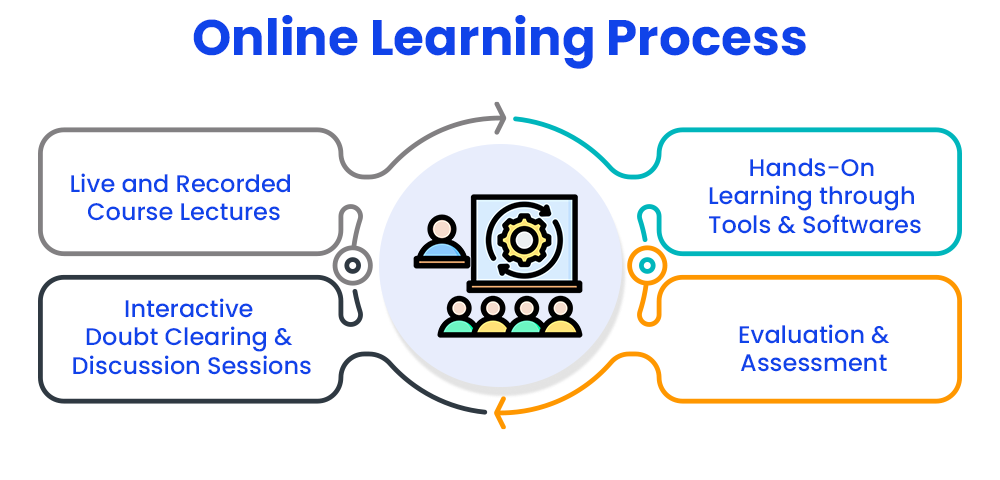
2) Tools Used in Online Learning
There are a large number of tools, softwares and technologies now available on the internet which can be accessed on a free-source or paid basis. The tools used in online learning are mostly always multimodal, i.e. making use of various media. Some of the common types of resources and tools used in online learning by top platforms and educational institutions have been described below:
- Online Lectures: Online lectures are the most common form of online learning resource in which an instructor teaches or introduces concepts as in a conventional classroom setup, but through the online mode (e.g. through a live meeting or as a video recording of the lecture). There are a number of video conferencing applications and softwares that are useful in conducting lectures in an online learning setup, such as Google Meet, Zoom, Microsoft Teams etc.
- LMS: An LMS stands for Learning Management System. An LMS is a platform that accumulates all the materials that one needs for an online learning course (e.g. course materials, reading materials, recorded video lectures, deadlines and timetables etc.) at one spot. So an LMS functions as a one-stop for all the learning needs of a student pursuing an online learning course. There are many universities, colleges and online learning platforms that have developed their unique LMS to enable ease of learning for students.
- Online Classrooms: Online classrooms are quite similar to LMS, but they have the added feature of providing various features like a classroom such as discussion forums, groups and subgroups, sections and reading materials etc. An online classroom simulates the features and activities of a physical classroom by creating a virtual environment for students to collaborate, interact and learn. There are many online classroom softwares and platforms, one of the most popular ones being Google Classroom.
- Lecture Recordings: Lecture recordings are another modality for knowledge dissemination in which instructors provide learners with lectures in the pre-recorded format, which can be accessed virtually. Recorded lectures are one of the top flexible learning tools available for learners through which one can flexibly complete a course/develop relevant skills at their own convenience, pace and time.
- Audio-Video Course Materials: Audio-video course materials are an engaging learning tool for the online mode. A-V materials can incorporate a number of tutorials, practical aspects of a concept, guides, critical analyses etc. depending upon the nature of learning being pursued. Video lectures, recordings of lectures as well as other forms of interactive videos are a part of audio-video course materials.
- Journals: Journals are a rich source of learning for higher education. They help a learner to gain deeper insights into concepts as well as research about relevant topics. Most top journals in various areas of study are also available digitally now, with open-access or paid access. Online learning can be heavily facilitated with access to journals for learners as it is beneficial for deeper applicable and conceptual understanding of a concept.
- e-Books and Textual Course Materials: Being learning through the digital and virtual mode, the learning materials and books involved in online learning are often in the digital format. Students and learners in an online learning course can access e-books, PDFs, documents and other textual learning materials.
- Discussion and Doubt Forums: There are many softwares for learning, including LMS mentioned above, which also have incorporated forums for discussions and doubt resolutions. Discussion forums are dedicated to providing a platform to online learners to come together to interact, discuss and understand concepts better through a collaborative effort. Doubt forums are also a key tool for online learning as it provides the platform to learners to resolve their doubts and get the right guidance from instructors.
- Live Question-Answer Platforms: Live question and answer forums provide online learners with a platform to discuss their doubts, concerns and interact with instructors and peers in real time. They are useful for making online learning more interactive and engaging for learners.
- Webinars: Webinars can be conducted for a variety of purposes, and are certainly useful for online learning as well. They can be one-way or interactive, and can be useful for learners to gain more insights into the relevant area. Many online learning courses also include regular webinars (often with experts and professionals in a field) to ensure that students get more insights into an area.
- Collective Softboards and Jam Boards: These tools are similar to blackboards and soft boards in a conventional classroom, but they are primarily virtual tools. Virtual soft boards and jam boards allow the online learners and instructors to collaborate and work together on ideas, discussions, projects etc. together in real time, and can be excellent tools when brainstorming and discussions over virtual media are involved.
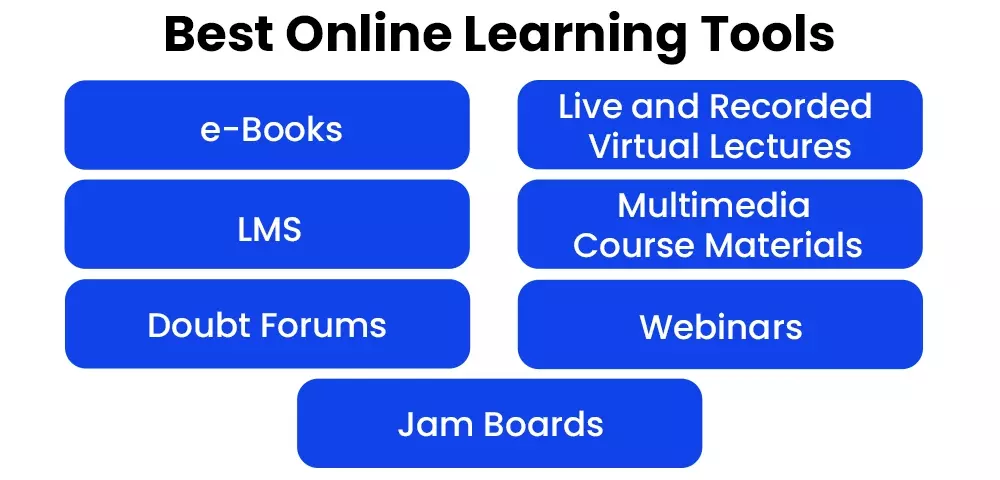
So, as can be seen, there are a vast number of softwares, tools and applications which can be used and accessed very conveniently by learners through an internet connection and a mobile electronic device, making online learning easy, convenient and engaging alongside.
3) Evaluation and Assessment in Online Learning
The methods of evaluation and assessment in online learning are becoming increasingly rigorous and holistic to capture how well a student is able to learn and develop insights. Accordingly, there are a large number of tools and platforms developed to track learner’s progress through the online mode.
The integrity of assessment and examinations in an online mode are also maintained through various AI technologies which can track fair examination and assessment practices.
A few of the common ways to assess and evaluate online learning include:
- Online Quizzes: Quizzes can be an engaging tool for online learning and assessment which can be used to track the progress of learning through interesting, learner-oriented questions in a number of rounds. Feedback of performance on quizzes can also help learners to identify their weak and strong areas and accordingly dedicate attention.
- Online Tests: These tests can be written/typed as in conventional tests, or they can be in the oral format. Instructors can choose to have live online tests in oral mode.
- Online Assignments: Similar to conventional assignments, online assignments are one of the most popularly used tools for assessment in online learning. These can include typed assignments, assignments in the form of presentations, research-based projects, research assignments, experiential or reflective assignments etc.
- Group Activities: To ensure peer interaction and foster interactive learning in students, group activities can be a suitable form of assessing the learning and insights of the learners. Group activities can include group discussions, group presentations, debate sessions, group projects and so on. Group activities can be assessed collectively as well as on an individual basis as well. Online tools and technologies have now made it possible for learners across geographical boundaries to come together, interact and develop ideas and prepare projects collaboratively in real time using the internet and virtual media.
- Experiential Exercises: Experiential exercises can be useful for developing critical insights among students and evaluating them upon the same. The methodology for the same can include presentations, critical analyses of documentaries etc.
- Online Proctored Examinations: This is by far one of the biggest developments in online learning, as now there are many AI softwares available to conduct full-fledged proctored examinations completely through virtual modes. These online softwares further have provisions to track student behaviour during examinations to prevent any unfair practices and maintain the integrity of the examination. Online examinations have all the necessary rules, regulations and systematic logistics as an offline exam and are equally rigorous and well-conducted.
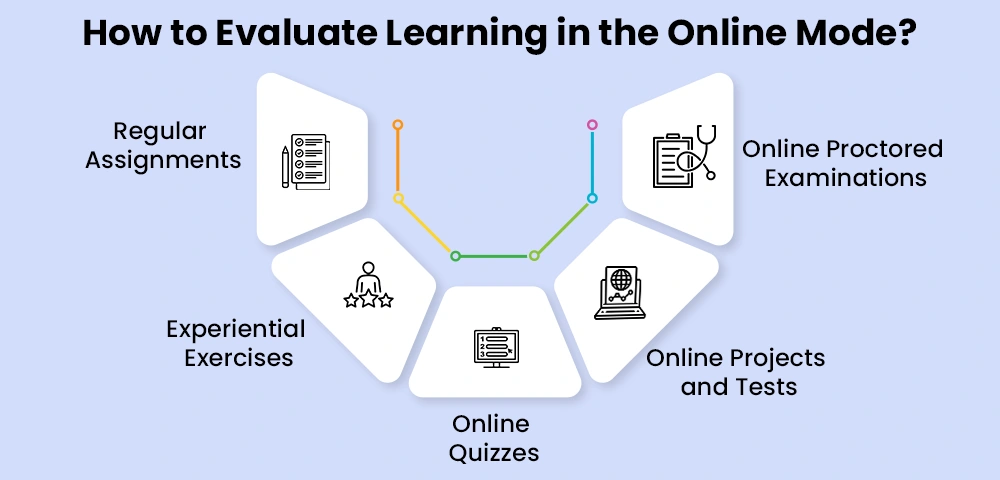
So, today, there are various tools and facilities to evaluate a learner’s understanding and academic progress in a course. Online learning involves an all-round assessment of the learner’s progress throughout a course.
Top Online Learning Platforms In 2026
The popularity of various online learning platforms have grown as internet services have become more accessible to a large segment of the population across the globe. Internet facilities as well as access to various electronic devices now enables many learners, belonging to various locations and age groups, to access online learning.
But how is online learning accessed? A common methodology of pursuing any online learning course is through online learning platforms. There are a large number of popular online learning platforms that provide courses in various domains, on a free access or paid basis.
Here we have listed some of the best online learning platforms available in 2026 that can be accessed from learners across nations.
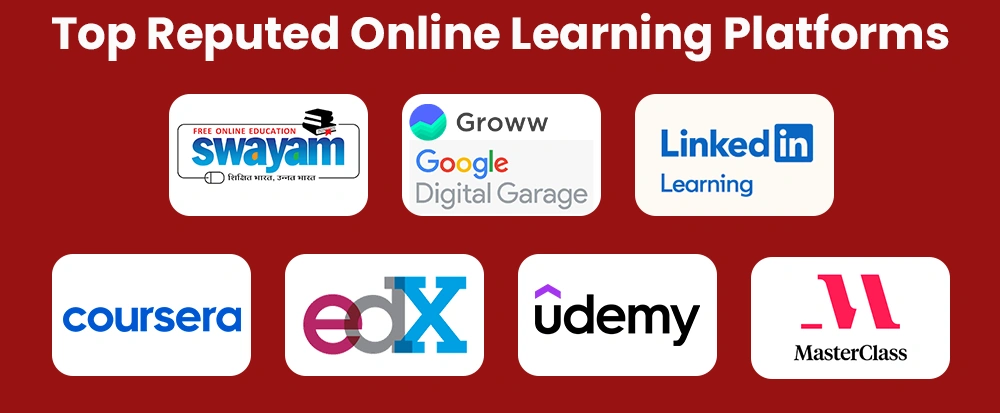
1) Swayam Portal
The Swayam portal is a Government of India initiative for students in India to access free-source as well as paid online learning courses across a variety of areas like management, commerce, teacher education, health sciences, humanities and art, mathematics and sciences and so on.
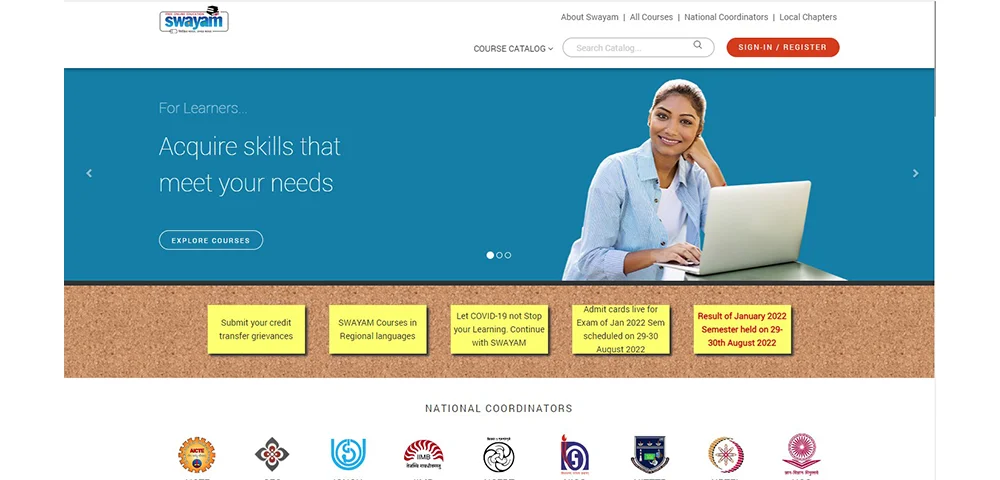
- There are a number of certification courses, skill enhancement courses and core courses for degrees or diplomas available on the platform.
- Swayam enables you to pursue courses free of cost, as well as transfer the credits for the course from the online learning platform to your main degree/diploma by paying a minimal fee amount and appearing for an examination after course completion.
- Courses at the level of school education, undergraduate education as well as post graduation are available on Swayam to meet the diverse needs of online learners.
- Top bodies and educational institutions that provide their courses on Swayam include IIM, Bangalore, IGNOU, NIOS, AICTE etc.
Grow Google and Google Digital Garage
Google’s very own online learning divisions, Google Digital Garage and Grow Google provide online learners with a number of skill development and certification courses to enhance themselves.
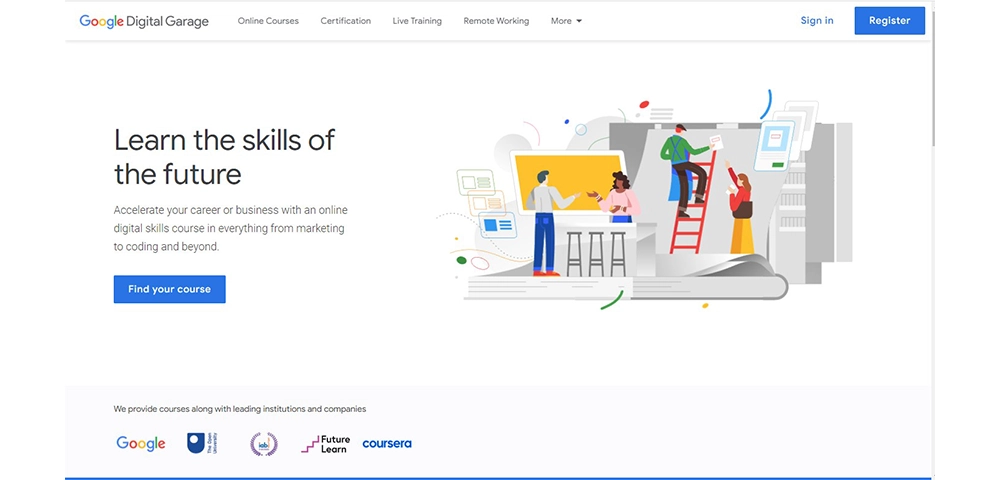
- Google Grow and Google Digital Garage provide courses in domains like well-being, social psychology, digital marketing, machine learning, business communication etc.
- These platforms have both paid and unpaid courses for upskilling.
- Google is a search engine giant and its online learning division is a reliable source for online learning. The online learning courses provided on these platforms are up to date, industry-oriented and effective for skill upgradation on a short-term basis.
- Although suitable for most learners, these courses meet the needs of working professionals most accurately as they provide an updated and industry-oriented curriculum to upskill oneself.
3) LinkedIn Learning
LinkedIn Learning was formerly known as Lynda. This is an online learning platform by the professional social media site, LinkedIn. This online learning platform has a number of fully online certification courses.
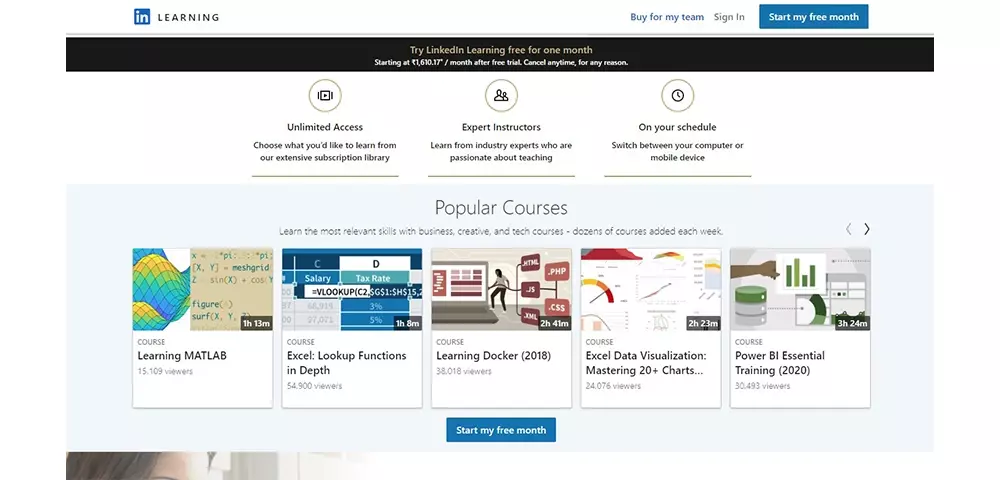
- LinkedIn Learning provides online learning courses in fields such as creativity, business and business growth, coding and technology.
- LinkedIn Learning provides paid certification courses in the online learning mode. Free trials of these courses are also available on the platform.
- Various industry professionals and experienced instructors provide the courses on this platform.
- Working professionals as well as students pursuing higher education can take up the courses on LinkedIn Learning to upskill themselves.
4) Coursera
Coursera is one of the most popular online learning platforms. Since the beginning of the popularisation of online learning, Coursera has been one of main online platforms that provides online learners with a diverse range of certification and degree courses on the platform.

- Coursera is a reliable online learning platform since it has experienced instructors, top institutions, and professionals providing the various online learning courses.
- Coursera has both unpaid, free-access courses as well as paid courses.
- Coursera is a MOOC platform that has general certification as well as degree courses.
- There are a vast domains of courses provided on this platform ranging from data science, management, computer sciences to liberal arts, humanities, health sciences and so on.
- Top collaborators of Coursera include Duke University, University of Pennsylvania, University of Michigan, Ashoka University, Imperial College London etc.
5) edX Learning
Similar to Coursera, edX Learning is also an online platform providing a number of paid and unpaid Massive Open Online Courses (MOOCs). This platform is a reliable and affordable source of online learning.

- edX has a number of free access courses and paid certification courses as well.
- The certificates are issued by the platform only for the paid courses.
- There are a number of areas in which students can pursue online learning through edX such as mathematics, computer science, chemistry, business and management, commerce, arts and humanities, architecture and many more.
- Top educational collaborators of edX Learning include the likes of Harvard University, University of Arizona, IIT Bombay, Imperial College of London, University of Oxford, University of Cambridge etc.
- This platform has online learning courses and certifications for students and working professionals seeking further education and upskilling.
6) Udemy
Udemy is mainly an upskilling platform that allows individuals to seek skill enhancement and knowledge in specific domains which can be educational, professional or even life-skills oriented. Udemy provides a number of MOOCs for upskilling, skill development or professional training.
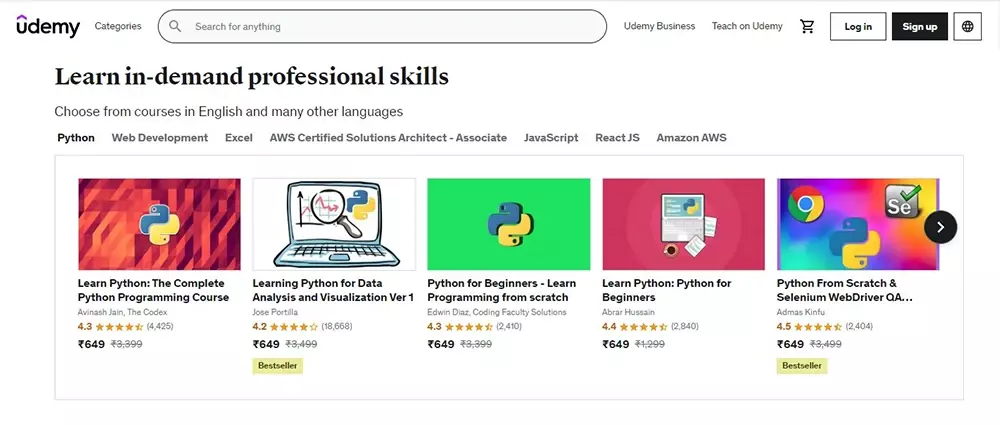
- Udemy has both paid and unpaid courses.
- This platform has many online learning courses for those students who wish to develop life skills or skills pertaining to professional domains as well.
- Udemy has collaborators on its platform like Google, GoFundMe, Tata, Volkswagen etc.
- Some of the popular areas in which Udemy provides online learning courses include IT and software, design, business, data science, personal development etc.
7) Masterclass
Masterclass is also a unique online learning platform which allows learners to pursue short-term courses in various areas of life like cooking, entertainment, art etc.

- The online courses of Masterclass are taught and delivered directly by celebrity figures in the domain who have an authority and expansive experience in their fields.
- Masterclass is not a professional or academic platform but an online learning platform for developing one’s knowledge and skills in specific areas such as art, writing, culinary studies, business, design and style etc.
- Masterclass is a paid online learning platform. Students can pay a subscription fee and get unlimited access to the courses on the platform.
- Masterclass online classes are generally asynchronous, i.e. the classes are not conducted live. They are one-way recorded online lectures and tutorials.
8) Other Sources
Other common sources and platforms for online learning include Udacity, SkillShare, Unacademy, UpGrad, YouTube (for audio-visual tutorials about various subjects and professional areas) etc.
Best Online Learning Courses In 2026
The possibilities of finding various online learning courses are endless with various platforms providing a large number of alternatives to choose from. It is important to choose the right online course for yourself, and there are a number of important factors that you should consider while choosing an online course (INSERT LINK FOR TOP 10 FACTORS TO CHOOSE ONLINE COURSE).
There are various online courses available on the internet, but a few of them are highly valued and popular. Here we have listed a few of the top online learning domains and courses that can provide you an edge in the professional and academic world.
1) Online MBA
Management is one of the most popular domains of study and career. An MBA is one of the lucrative degree courses and provides comprehensive knowledge about the various aspects of management in the professional setting. Now, many top B-schools and universities are providing students with online MBA courses. These degrees are considered valid in academic and career pursuits and are more affordable than full time regular MBA courses. Many online platforms provide online MBA degrees to students in addition to the universities and colleges that offer this degree.
There are a large number of specialisations offered in an MBA in the online mode, including those like operations management, marketing management, human resource management, finance management, IT management, banking and finance management, business analytics management, logistics and supply chain management etc.
Compare the best online MBA courses offered in India as based on various important factors like fees, accreditations, course curriculum etc. on College Vidya.
2) Online BCA and MCA courses
Computer applications is a useful field to venture into if you are interested in the domain of IT and technology. A BCA course is an undergraduate course in computer applications while MCA is at the postgraduate level. Both these courses help the learner to develop practical skills and knowledge that are helpful in applying them in a professional setting.
Online BCA and MCA courses have been designed and approved as per the complying standards of online education, and there are many specialisations that are available- cloud computing, data science, blockchain, cybersecurity, artificial intelligence and machine learning etc. that can be taken up.
Online learning platforms and various online education divisions of universities and colleges provide these courses to students. Compare and select the best online BCA and MCA course online for yourself from College Vidya, which lists the top colleges and universities that provide it.
3) Data Science Courses
Data science is a field of data application growing at an exponential rate. Data scientists now have enormous opportunities for career growth and exploring job roles in top MNCs, finance sector jobs, business analytics and related fields.
Data science courses offered in the online mode, whether certificates or diplomas and degrees, can be extremely helpful in developing and honing one’s professional skills and application abilities. Online data science courses are an affordable and convenient alternative for full-time courses in this domain.
|
Top Trending Articles on Data Science |
|
Many online MOOC platforms along with universities provide a number of online courses in data science and data analytics that can be taken up at the UG, PG and professional levels. Explore the top accredited online MCA, online BCA, online M.Sc, diplomas and certification courses in data science on College Vidya, to find out the online learning course that suits your learning needs the best!
4) Artificial Intelligence and Machine Learning
AI and ML are emerging and prospering areas of focus in IT and computer science domains. Many technological universities are offering online certifications, diplomas and degrees in AI & ML.
Many online learning platforms also have short-term certifications on AI and ML. Such courses equip students with foundational knowledge of artificial intelligence and machine learning domains, as well provide practical understanding and hands-on training in AI and ML applications.
Some other online course domains and articles which are in trend and popular demand today include:
Online Learning: Advantages/Pros and Disadvantages/Cons
Like any other new innovation and technological development, the domain of online learning is not free of its own set of disadvantages as well as merits. Online learning is a relatively newer domain of education in the mainstream. As a result, it is still being met with a little hesitance.
However, here we have provided a detailed account of the various advantages and disadvantages of online learning to help you evaluate its benefits and weaknesses as a learning approach. Some of the major strengths and advantages of online learning include:
Online Learning Advantages/Pros:
1) Increased Access to Education
One of the major milestones of online learning has been to make education and learning more accessible to a large number of students. In this regard, online learning’s biggest achievement has been to help anyone with a stable internet connection and an electronic device get access to courses and tutorials of learning from top educators. So, online learning has certainly made education more accessible to learners from across the globe, thus transcending boundaries of geography, time zones and terrain.
2) High Flexibility of Learning
A major advantage of online learning over conventional approaches is that it provides extensive flexibility of learning to the students. Whether in terms of time devoted to completing the course, the pace of learning, the level of comprehensiveness at which one wants to study, online learning provides flexibility and the alternatives to choose from to learners. So it is very suitable for those individuals who want to learn more about a specific domain but cannot adhere to a rigid schedule, such as working professionals.
3) Convenience of Learning
Convenience of learning is a major advantage of online learning. Online learning has minimal logistic requirements (a stable internet connection and electronic, internet-enabled mobile device), does not have rigid schedules to be adhered to, and does not require the learner to travel or relocate for education and learning. In this sense, online learning is highly convenient and easy to pursue as well.
4) Affordability of Learning
Online education is also more accessible to a large number of learners because it is more cost-efficient and affordable for a larger population to pursue. Since online learning courses have limited logistic requirements, the cost of education in the online mode is considerably lower for similar accreditations in the regular mode. This makes online learning a more affordable and accessible alternative to full-time or regular modes of education, especially in India.
5) Global Networking and Education
With the advent of the internet, the world is turning into a glocal community. The same is applicable for online education as well. Through online education today, learners from across the world can not only contact and network with like-minded learners, but also get direct insights and education from instructors of top universities, colleges and educational institutions across the world. This global networking and peer group formation is not possible in a conventional learning setup. Moreover, online learning technology has also made foreign education much more accessible to students and professionals.
6) Holistic and Innovative in Nature
Online learning makes use of a number of innovative tools, technologies and multiple modalities to deliver education to learners. So, it deviates significantly from the conventional lecture system of learning. Moreover, it often includes a blend of learning pedagogies and methods that provides facilities for live, synchronous learning as well as self-paced learning. So, it is a holistic approach to education that is tailored to meet the needs of learners in the 21st century.
7) Fosters Self-Discipline and Monitoring
Online learning undoubtedly requires a large amount of concentration and dedication on the part of the learner. Online learning takes place in a virtual simulation of a classroom, hence the learner does not find themselves in a physical learning environment. Hence, to avoid distractions and dedicatedly complete the course, the student must actively practise self discipline, monitor one's progress in the learning procedure as well as motivate oneself to pursue an online course.
So, online learning is helpful in increasing the concentration, focus as well as self discipline in learners. Such effects have also been shown in many studies and researches. Online education and online learning processes have been found to be helpful in increasing attention and memory span of students, especially during the global coronavirus pandemic.
8) Rising Recognition
A major benefit of taking up courses through the online mode today is that its recognition in mainstream educational systems and circles is increasing. So, online learning courses, whether MOOC certifications or full-fledged degrees and diplomas, are now being recognised as equivalent to regular and conventional degrees. As a result, with the many benefits of online learning, this recognition confers an added benefit to learners to learn flexibly but receive the same benefits in academic and professional settings.
9) Online Education Meets the Individual Needs of Learners
One of the major differences between conventional learning versus online learning is that the latter provides more individually-tailored education to the learner. Many online courses provide learners with learning materials, evaluation as well as feedback based on the individual learning needs and performances of the learner. Moreover, there are endless options available in the field of online learning, whether in terms of the level of education (e.g. school-level, undergraduate level, postgraduate level or professional level), the time one wants to invest in upskilling (e.g. short term or long term degree courses), the domain one wants to learn more about or the type of accreditation they require (a degree or a diploma or a certification). So, the individual learning needs of a person are effectively met in online learning.
10) Technologically Advanced Approach to Learning
With changing industrial as well as academic needs in the fast-paced world today, the regular and conventional mode of learning may be unable to fill the gap in learning and application. In contrast, online learning utilises a large number of resources and tools to deliver a course. This incorporates the use of a large number of softwares and technologies, which provides students with a comprehensive and holistic understanding of the current practices and recent developments in a field of study. Online learning provides this major benefit over a conventional learning course.
So, there are a number of benefits for learners as well as strengths of the method as an approach to learning. The method is innovative, has a huge scope for future growth and can definitely be of much value to students and professionals.
However, this is not to say that online learning does not have limitations or weaknesses as an approach. Since it is still a budding learning mode, there are a few areas of improvement for online learning. Some of the weaknesses and limitations of online learning approach include:
Disadvantages/Cons of Online Learning
1) May Not be Accessible for All
Online learning requires access to internet facilities as well as an electronic mobile device in the least. Many learners who do not have access to these resources may not be able to pursue online learning. Moreover, certain environmental factors such as geographical location, climate etc. can impact the quality of online learning, as it affects the internet services, upon which online learning is completely dependent. Certain remote geographical locations may not have internet connectivity at all, making it impossible for learners in those areas to engage in learning through the virtual mode. So, online learning, although convenient and flexible to pursue, may not be accessible for many students.
2) Logistic Limitations
Some logistic and practical limitations may be involved in an online learning approach as well such as lack of accessibility to the resources, connectivity problems, lack of digital literacy in many students as well as unavailability of infrastructural support (in terms of softwares, journal access etc.) especially in developing nations. This is a setback in the path of mainstreaming online learning.
3) Isolating in Nature
Online learning in itself helps the learner to connect to peers and experts in various fields. However, although digital networking is a benefit of online learning, the nature of study in the online mode can be isolating as it does not allow a learner to be in the physical presence of classmates, peers and instructors. The nature of the classroom in a virtual learning setup is limited to the screen, and students and learners can experience isolation when completing online education. Moreover, an online learning environment can also lead to a cutoff from the physical world and society around the student, as they must complete education on a device which may require a large amount of self-motivation and discipline. Unlike conventional classroom learning, wherein students and learners can interact in person, online learning can allow connection and communication in correspondence, which may produce a sense of isolation in many learners.
4) Can Pose Health Risks
Online learning can have some detrimental effect on one’s health, such as on the fitness of a person (as it promotes a sedentary lifestyle), affect one’s vision as well as cause headaches. Students of the online learning mode may also suffer problems related to insomnia, sleep schedule disturbances, (especially pertinent in the case of students pursuing international courses with different time zones involved), anxiety, depression etc. associated with isolation. So as a mode of learning, online learning can be associated with health risks.
5) Can Limit Communication and Networking
For some students, the online mode of learning can be a setback in communicating with peers and networking efficiently. Since the mode of communication for online learning is completely virtual and lacks any in-person discussions or interaction opportunities, learners may find it inhibiting to network and form peer groups. Thus, while online learning provides the opportunity to connect to peers, experts and professionals across the globe, the virtual nature of communication can prove to be an inhibiting factor.
6) Lowered Motivation towards Learning
A major setback of online learning is that the convenience and flexibility associated with it can in turn lower the motivation of learners towards actively participating in the course or complete it in a disciplined manner. For example, during online lectures, many students find difficulties in concentrating, sustaining attention in the class, avoiding distractions as well as completing the course in a disciplined manner. This is one of the major disadvantages of online learning as stated by many students.
7) Low Awareness and Myths about Online Learning
Being an area of learning which is still in its developmental phases, there are a large number of myths persistent about online learning. Added with the low levels of awareness about online learning as a mode of education, its pedagogy, tools and accessibility. As a result, many learners are wary of taking up online learning courses. One of the most common confusions about online learning that students and professionals have is about its recognition and validity. The recognition for online learning is on the rise today, and many top universities, colleges and educational centres now provide online courses. Moreover, online learning certifications, diplomas and degrees are held valid and equivalent to offline educational courses in many nations, including India.
8) Incompatible for All Areas of Learning
Just as some courses and subject domains can be covered comprehensively through an online mode of learning, there are certain technical and professional areas which cannot be delivered through the online mode feasibly. Subjects and disciplines like engineering, aviation technology, medicine and health service etc. cannot be delivered online since they require the student to gain practical hands-on experience and rigorous training, which can't be provided through virtual mode.
9) Expensive and Cumbersome for Trainers
Another drawback of the online learning process is that it can be costly and cumbersome for the trainers and instructors. Teaching and delivering courses in the online mode requires the usage of electronic equipment and devices such as internet connection, an audio visual device which can be connected to the internet, a camera and a mic (in case of voice recorded lectures) etc. This might be costly for many teachers and instructors. Moreover, developing softwares like LMS, subscribing to AI powered-tools, platforms, simulation technologies etc. can be very expensive in addition as well.
Moreover, many instructors and experts in a domain may not be well-versed with technology, and may require sufficient training and practice before being able to teach online effectively. So the process of online learning can be tedious and cumbersome as it requires both extensive training as well as expenditure before it can be delivered.
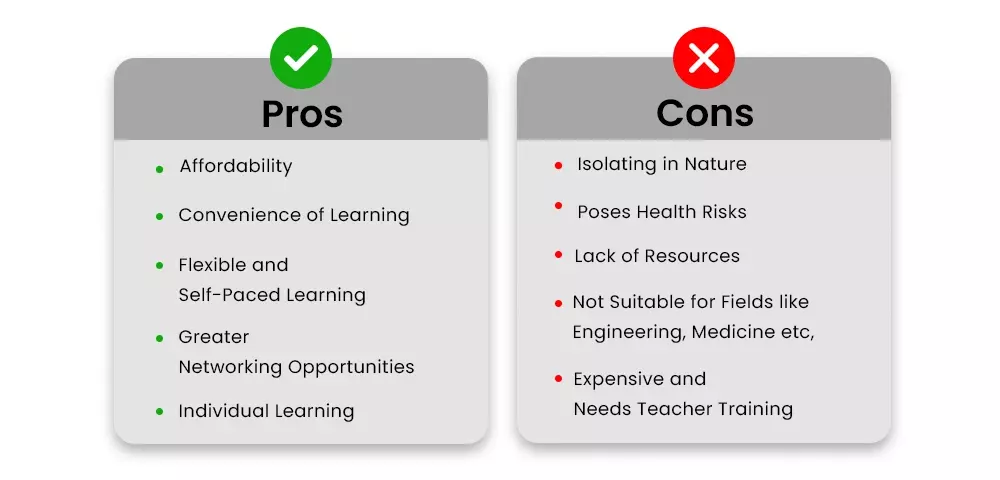
|
Affordability |
Isolating in Nature |
|
Convenience of Learning |
Poses Health Risks |
|
Flexible and Self-Paced Learning |
Lack of Resources |
|
Greater Networking Opportunities |
Not Suitable for Fields like Engineering, Medicine etc, |
|
Individual Learning |
Expensive and Needs Teacher Training |
So, online education comes with its many strengths and weaknesses. There are a lot of areas in online education, which can be improved and developed further. The scope of growth of online learning is immense and with the support of innovative technologies, the field can develop into a mainstream mode of education in the Indian setting.
Status of Online Learning In India
If you are an Indian student or working professional interested in taking up online learning, there are a large number of facilities and options available for you. There are many excellent online learning platforms where a large number of courses are available for upskilling or higher education.
In India, online learning is offered mainly in the following 3 formats:
Many universities and colleges provide their own online education courses, while some also offer these courses by forming associations with MOOC platforms. The recognition given to online learning in India is also high and actively encouraged.
As per the UGC-DEB, which is a prime government statutory body of education, online courses are of equal value and credibility as offline courses (provided you complete them from accredited and approved institutions).
Moreover, the Government of India also encourages students to take up online learning right from the school level, for which, it has also designed its own online learning MOOC platform- Swayam, where a large number of online courses in diverse subject areas can be obtained for free or minimal course fee.
So, the future scope of popularising online learning in India is also good, especially after the coronavirus pandemic, where many learners have experienced the online learning process. Many myths about online learning have been busted in the past few years with growing digital literacy and prevalence of online courses increasing during the coronavirus pandemic.
Online Education During Coronavirus Lockdown
The popularity and utility of online learning has come handy to learners across the globe at various levels during the recent COVID-19 pandemic which forced humans to shut themselves out from the world in the confines of their homes. In such a situation, online learning emerged as a boon for students and learners as it helped to continue education without any disruptions.
Online learning has become very popular during the period of 2020-21 and the advent of online learning courses has only grown during this time, with more and more institutions of online and virtual modalities in providing comprehensive knowledge to learners. Many more reliable and accredited platforms for online learning have also emerged during this period, and free online courses are also being offered to enable a larger number of learners to benefit from the online learning facilities.
Online learning during the pandemic has provided an opportunity to learners and instructors to experience the process of virtual education and skill development, and explore the available tools and applications in this field. It has allowed us to collectively exemplify the benefit of online education over regular learning, as it ensures that the educational process needn’t stop with the inability of the students to be present in a physical setting together.
Thus, the coronavirus pandemic has been crucial in popularising online learning, especially in India.
Conclusion
Online learning as a field of education and learning is progressing by leaps and bounds. The courses and arenas of learning and the tools and technological support available for learning are on the rise. There are many types of online learning, such as synchronous, asynchronous and hybrid online learning, which make use of diverse tools and softwares for knowledge dissemination. There are many online courses which are highly valued, and many tutorials and crash courses in the OL mode which can be completed for free by students.
Upskilling and learning through virtual mode is the new educational normal, and hence it's about time to start exploring various online education courses. So, if you are a person interested in online learning, explore more about online education on our website, www.collegevidya.com and compare the best online courses at the UG, PG and professional levels.
FAQs (Frequently Asked Questions)
Online learning is the form of learning which makes use of the virtual and internet-based methods, tools and platforms for dissemination of learning and education. Online learning, as the name suggests, refers to learning through virtual means.
The meaning of online learning is the learning experience gained through the online mode, i.e. making use of some internet-based tools or virtual platform and means. It is the digital mode of learning which includes the use of internet facilities.
Online learning can be of various types depending upon a number of factors. The major types of online learning include synchronous (live) learning, asynchronous (self-paced) learning, hybrid online learning, individual online learning, interactive online learning and more.
A few of the top online learning platforms include UpGrad, Coursera, Swayam Portal, Udemy, edX Learning, Masterclass etc. Swayam is a government portal of India that can be used for upskilling and online learning by working professionals and students alike. Some of these platforms provide completely free online learning courses, while others may have a vast number of courses on a paid basis.
A few of the common tools used in online learning include live video lectures, video lecture recordings, e-books, audio-visual aids for learning, journals, jamboards and softboards, LMS, webinars, live question-answer forums, discussion forums etc.
Free online courses are the tutorials and certifications available in the virtual mode of learning free of cost. These include the short term certifications available on platforms like Swayam, youtube tutorials, free courses on Coursera, edX Learning, Google Digital Garage etc.
There are a number of excellent and highly demanded online courses. Some of the top ones include online MBA, online BCA and MCA, online B.Com and M.Com courses, certificate courses in Artificial Intelligence and Machine Learning, Data Science, Digital Marketing, Foreign Language courses, Project Management courses etc.
Online learning has many benefits for students such as convenience of learning, flexibility in study schedule and pattern, self-paced nature of the course, affordability, ability to form a vast and global peer network, pursue the course with other pursuits like job and so on. One of the greatest benefits of online learning is its rising recognition and the same value as regular courses.
Yes, with the growing advent of the active use of technology and virtual media for education, online learning is gaining value and recognition as top universities, colleges and educational institutions are turning to this mode of learning. Especially after the coronavirus pandemic in 2020, online learning is increasingly being identified as one of the mainstream modes of learning now.
There are many advantages of online learning like affordability of the course, flexibility of learning, convenience of learning, self-paced learning, networking advantages and so on. Some of the prominent drawbacks of this mode of education include the lack of sufficient resources (e.g. stable internet connection, electronic devices), distractions and lack of motivation, isolation, health risks associated with excessive screen time etc.
Examples of online education include the online degrees, diplomas and certificate courses available on platforms like Upgrad, Coursera, Swayam, Google Digital Garage etc. The shift of education from classroom learning to online mode during the coronavirus pandemic is also an example of online education.
Yes, when you obtain online education from a duly approved institution of higher education, it is considered valid in India, as per the guidelines of the University Grants Commission (UGC), the premier accrediting and statutory body of higher education in India.
An LMS or a Learning Management Software is a software designed for online learning needs which brings together the various pedagogical tools and aspects involved in the process on the single platform. An LMS has features for video lectures, archive of lecture recordings, course materials, reading materials etc. along with academic calendar, deadlines for assignments and projects etc. on a single application/software.

Idea Alchemist / Concept Creator / Insight Generator
We are an online education platform where users can compare 100+ online universities on 30+ X-factors in just 2 minutes. With an active CV community, we have transformed online learning to quite an extent. With the CV Subsidy scheme, we contributing to GER in India while helping our learners with their finances in their “Chuno Apna Sahi” journey!
Every query is essential.
Our team of experts, or experienced individuals, will answer it within 24 hours.
Recommended for you
Tired of dealing with call centers!
Get a professional advisor for Career!
LIFETIME FREE
Rs.1499(Exclusive offer for today)

Pooja
MBA 7 yrs exp

Sarthak
M.Com 4 yrs exp

Kapil Gupta
MCA 5 yrs exp
or



Career Finder
(Career Suitability Test)
Explore and Find out your Most Suitable Career Path. Get Started with our Career Finder Tool Now!
ROI Calculator
Find out the expected salary, costs, and ROI of your chosen online university with our free calculator.

